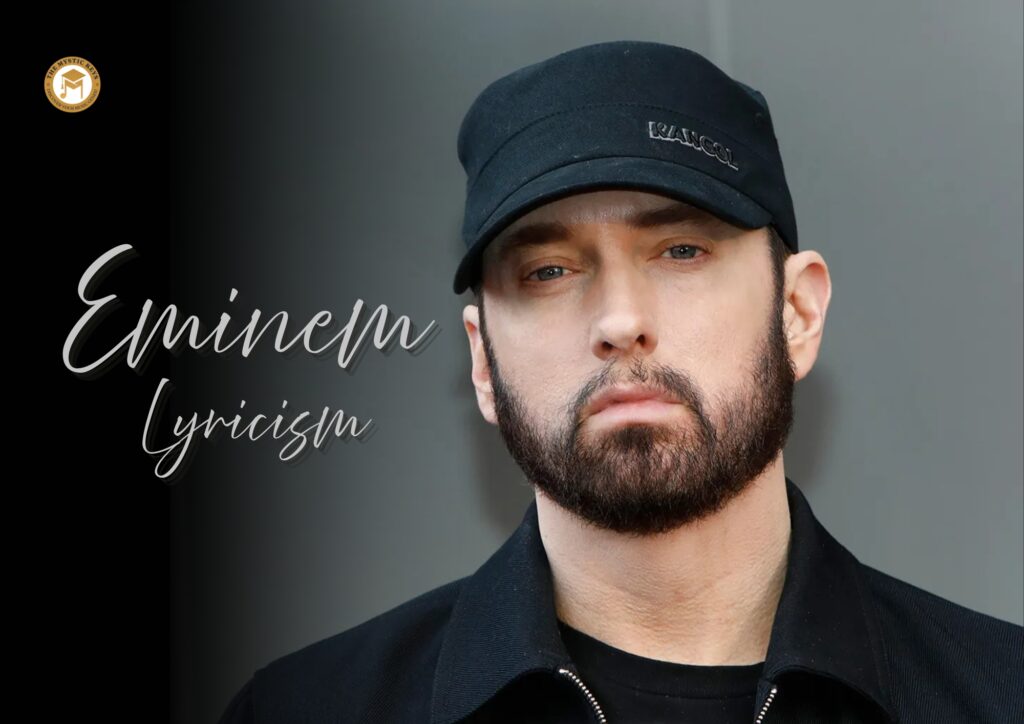Eminem Lyricism | Rap God’s Wordplay & Storytelling
Few names in the music industry evoke as much awe and respect as Eminem — the artist who transformed rap into a poetic battlefield of emotions, metaphors, and raw truth. Known as the “Rap God,” Eminem (born Marshall Bruce Mathers III) has not only mastered the art of lyricism but also redefined it, combining complex rhyme schemes, intricate storytelling, and fearless self-expression.
What sets him apart is that his songs are more than just music; they are verbal masterpieces that seamlessly blend vulnerability with ferocity, humor with pain, and technical precision with emotional honesty. In other words, every track is a carefully crafted journey that pulls listeners in, inviting them to experience both his skill and his soul.

The Foundation of Eminem Lyricism
Eminem’s lyricism stands apart because it’s rooted in authenticity. From his turbulent childhood to his rise to stardom, he never shied away from revealing his flaws, anger, or struggles. His words are reflections of real experiences — growing up in poverty, dealing with family issues, battling addiction, and confronting fame’s darker side.
This unfiltered honesty creates a connection with listeners that few artists can match. When Eminem raps, it feels personal — as if he’s pulling you into his world, one rhyme at a time.
But authenticity alone doesn’t define him. What truly elevates Eminem is how he expresses his truth. He transforms every verse into a lyrical puzzle — intricate, layered, and meticulously crafted. His internal rhymes, wordplay, and flow variations make even the most aggressive tracks sound like poetry.
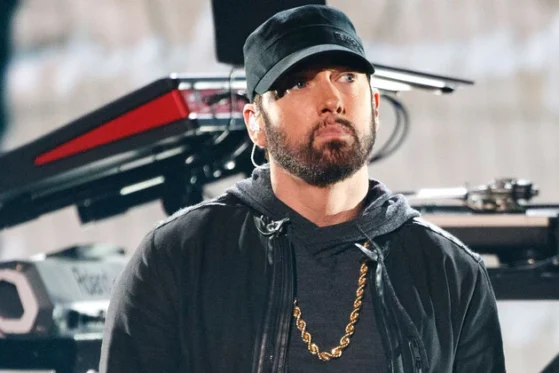
Eminem Lyricism and the Art of Wordplay
Eminem’s wordplay is nothing short of genius. He bends language to his will — manipulating syllables, sounds, and meanings to create multi-layered rhymes that few rappers can imitate.
Consider songs like “Rap God” and “Lose Yourself.” In “Rap God,” he sets a record-breaking pace while maintaining clarity and coherence — rhyming entire paragraphs with precision. In “Lose Yourself,” he captures the tension between fear and ambition with every syllable:
“His palms are sweaty, knees weak, arms are heavy /
There’s vomit on his sweater already, mom’s spaghetti.”
This opening line may seem simple, but its rhythm and imagery pull listeners directly into the story. Eminem’s choice of words, cadence, and flow build momentum, creating both urgency and relatability.
His ability to rhyme multisyllabically — often connecting sounds across several lines — demonstrates not just creativity, but mathematical precision. Tracks like “Till I Collapse” and “Godzilla” are showcases of linguistic athleticism, where each rhyme lands perfectly in time with the beat, even at impossible speeds.
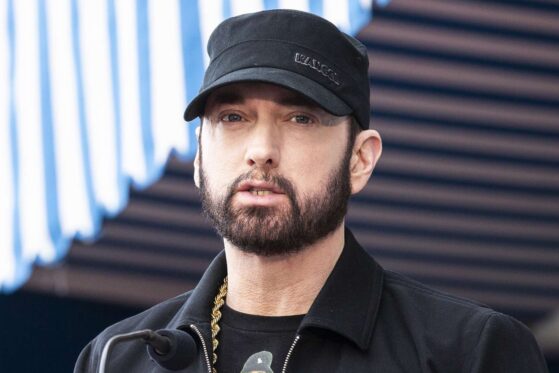
Storytelling that Hits the Soul
Eminem is not just a wordsmith — he’s a storyteller of the highest order. Many of his songs feel like cinematic journeys told through rhyme.
Take “Stan” — one of his most iconic tracks. It tells the haunting story of an obsessed fan through letters, gradually descending into tragedy. The track is structured like a short film — each verse adds layers to the narrative, culminating in a chilling ending that reveals Eminem’s own reflection in the story.
In “Mockingbird,” he switches tone entirely, speaking tenderly to his daughter about their family struggles. Here, his lyricism becomes deeply human — honest, vulnerable, and protective. No elaborate rhyme scheme can overshadow the raw emotion he conveys.
Eminem’s storytelling often blurs the line between fiction and reality. Through personas like Slim Shady, he explores darker, exaggerated versions of himself — using shock value and satire to comment on society, fame, and morality. His songs become social commentary disguised as chaos — provocative yet purposeful.

The Duality of Emotion and Technique
What makes Eminem truly unique is his ability to balance technical mastery with emotional depth. Many rappers can rhyme fast or manipulate words, but few can make those words truly resonate.
This duality is evident in songs like “The Way I Am,” where frustration and defiance explode through tightly woven verses:
“And I am, whatever you say I am /
If I wasn’t, then why would I say I am?”
Here, Eminem delivers both a declaration and a protest — a stark reminder that self-expression is his rebellion against judgment.
Conversely, his more reflective tracks, like “Beautiful” and “Not Afraid,” unveil a gentler, introspective side of Eminem. In these songs, he shifts from defiance to reflection, delivering messages of resilience, mental health awareness, and self-acceptance. By turning personal struggles into stories of universal empowerment, he demonstrates that vulnerability is far from weakness — it is, in fact, a profound expression of strength.
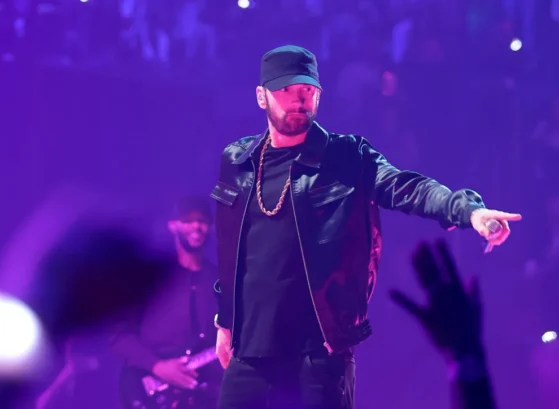
Cultural Impact of Eminem Lyricism
Eminem’s lyricism didn’t just transform rap — it reshaped modern songwriting. His intricate rhyme patterns and narrative depth inspired an entire generation of artists, from Kendrick Lamar and Logic to NF and Joyner Lucas.
He also broke barriers as a white rapper in a predominantly Black art form, earning respect not through image but through undeniable skill. Every syllable he wrote demanded recognition — and he earned it.
His lyrics often challenge social norms and confront controversial topics like censorship, addiction, race, and fame’s toxicity. While critics sometimes labeled him “provocative,” fans understood the underlying artistry — his ability to spark dialogue while staying brutally honest.
Even today, decades after his debut, Eminem’s verses continue to dominate lyrical analysis, with fans dissecting metaphors and double entendres like academic scholars. Few artists can claim that level of depth and devotion.

The Evolution of a Lyricist
Over time, Eminem’s writing evolved — from the rebellious aggression of “The Slim Shady LP” to the reflective maturity of “Music to Be Murdered By.” His later work showcases an artist aware of his legacy, experimenting with flow, wordplay, and themes while retaining his core identity.
His lyricism today blends the precision of a technician with the wisdom of a survivor. Whether he’s rapping about fame, fatherhood, or inner demons, there’s always a sense of evolution — a man who’s battled both the world and himself, yet still stands as one of rap’s greatest poets.
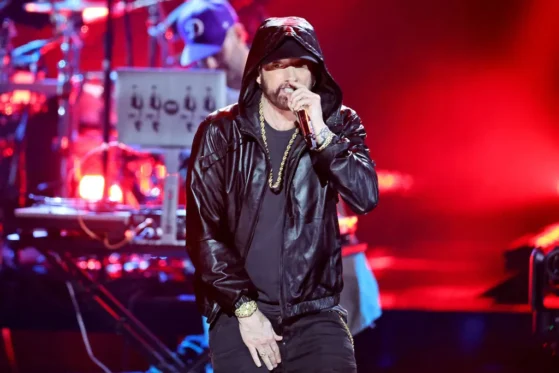
Why Eminem Lyricism is Unmatched
Eminem’s unmatched lyricism comes down to three things:
Depth of Expression: He turns personal struggles into universal emotions.
Technical Excellence: His rhyme schemes, flow, and delivery are mathematically intricate.
Fearless Honesty: He never censors his truth, even when it’s uncomfortable.
Together, these qualities create music that isn’t just heard — it’s felt. Each verse challenges listeners to think, feel, and reflect.

Conclusion | The Legacy of the Rap God
Eminem is more than a rapper — he’s a literary force and a master storyteller. Through Eminem Lyricism, he shows how words can move, inspire, and provoke.
Over time, his music has transcended genres, influencing not just hip-hop but the very craft of songwriting. At The Mystic Keys, we recognize this artistry, where each lyric carries meaning and every rhythm tells a story.
Moreover, as the Rap God, Eminem demonstrates that true lyricism goes beyond clever rhymes — it’s about painting emotions, weaving stories, and turning personal struggles into poetry.
Even decades into his career, his verses continue to resonate, proving that a legacy built on talent and truth endures. By studying Eminem Lyricism, musicians and fans alike, including those at The Mystic Keys, can see how purposeful words create timeless music.
For more information and exciting resources about learning music, visit our website at The Mystic Keys. For more music content and exciting offers follow us on
Facebook, Instagram, YouTube, LinkedIn, Twitter, Pinterest, and Threads.


